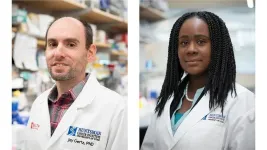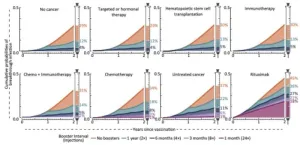(Press-News.org) Relatively short-term use of immunosuppressant medications to control an inflammatory disease was not associated with an increased risk of later developing cancer, according to new research led by scientists at the University of Pittsburgh and Mass Eye and Ear, a member of the Mass General Brigham health care system, and published today in the journal BMJ Oncology.
The findings should provide reassurance to patients and clinicians who may hesitate to prescribe the medications because they are known to increase the risk of cancer in people who take them over many years or a lifetime to prevent dire consequences, such as organ rejection in transplant recipients.
“When we got these results, I was reassured, and I hope patients will be, too,” said lead author Jeanine Buchanich, Ph.D., associate dean for research and associate professor of biostatistics at Pitt’s School of Public Health. “Immunosuppressants are widely used and transformative for care of patients with inflammatory diseases, but the potential concern that they carry a cancer risk has forced people to make difficult decisions without enough information. Alleviating that concern with use for inflammatory diseases will help people make the treatment decision that’s right for them.”
The new findings were from the Systemic Immunosuppressive Therapy for Eye Diseases (SITE) Cohort, which began two decades ago when principal investigator John Kempen, M.D., Ph.D., senior scientist and director of epidemiology for ophthalmology at Mass Eye and Ear and professor of ophthalmology at Harvard Medical School, approached Buchanich, who directs Pitt Public Health’s Center for Occupational Biostatistics and Epidemiology, to partner in evaluating cancer risk for people with non-infectious ocular inflammatory diseases taking immunosuppressants. These eye diseases are caused by immune dysfunction and do not themselves cause cancer but can be very serious, with blindness as a possible outcome.
The diseases are commonly treated with immunosuppressive medications, which patients generally take for several months to several years.
This new research adds evidence to the limited cancer risk associated with immunosuppressant treatments uncovered by the SITE study consortium. In a study published last month in Ophthalmology, the researchers found no increased risk in cancer-related and overall mortality in individuals taking commonly used immunosuppressants. The study included 15,938 SITE participants who were tracked for an average of 10 years.
The BMJ Oncology study included 10,872 participants, ultimately encompassing 84% of the enrolled SITE participants who lived in one of the 12 states from which the research team obtained data linking participants to each state’s cancer registries. Though most states track cancer incidence, there is no centralized federal cancer registry, and different states require different permissions and use different interfaces to share data. For this reason, it is difficult to do large-scale epidemiological cancer studies in the U.S., making this study incorporating years of data from multiple states a rarity.
The research team tracked each participant for an average of 10 years after they took immunosuppressant medications, or for a similar amount of time for those not taking immunosuppression, to see if they ever developed cancer. Four different categories of immunosuppressants – TNF-inhibitors, antimetabolites, alkylating agents and calcineurin inhibitors – were covered by the study, with some patients taking more than one type. Patients were on the medications for a median of one year.
Across all four classes of immunosuppressant medications the scientists found no evidence of excess risk of cancer in patients who took them on a short-term basis, regardless of medication dose.
While the study only looked at people with noninfectious eye diseases and the researchers caution that the results aren’t generalizable to everyone taking immunosuppressants, the results probably are generalizable to patients with inflammatory diseases, Kempen said.
“The patients in our study actually tended to have a lower incidence of cancer than non-immunosuppressed patients, suggesting that an increased risk of overall cancer from commonly used immunosuppressants given for the short- to medium-term is very unlikely,” said Kempen. “This result is foundational for a large number of patients with inflammatory eye conditions and a broad range of patients with other inflammatory diseases.”
Additional researchers on this study are Craig Newcomb, M.S., Nirali Bhatt, M.D., Tonetta Fitzgerald, Ebenezer Daniel, Ph.D., and Naira Khachatryan, M.D., Dr.P.H., all of the University of Pennsylvania (Penn); Terri Washington, of Pitt; C. Stephen Foster, M.D., of the Massachusetts Eye Research and Surgery Institution (MERSI) and Harvard Medical School; Lucia Sobrin, M.D., of Mass Eye and Ear and Harvard Medical School; Jennifer Thorne, M.D., Ph.D., Douglas Jabs, M.D., M.B.A., Kurt Dreger, Hosne Begum and Kathy Helzlsouer, M.D., all of Johns Hopkins University; Eric Suhler, M.D., M.P.H., James Rosenbaum, M.D., and Teresa Liesegang, all of the Oregon Health & Science University; H. Nida Sen, M.D., of George Washington University; Grace Levy-Clarke, M.D., of West Virginia University; the late Robert Nussenblatt, M.D., of the National Eye Institute; Careen Lowder, M.D., Ph.D., of the Cleveland Clinic; Debra Goldstein, M.D., of Northwestern University; Yannek Leiderman, M.D., Ph.D., of the University of Illinois, Chicago; Nisha Acharya, M.D., of the University of California San Francisco; Gary Holland, M.D., of the University of California Los Angeles; Russel Read, M.D., Ph.D., of the University of Alabama at Birmingham; James Dunn, M.D., of the Wills Eye Hospital; Pichaporn Artornsombudh, M.D., of Somdech Phra Pinkloa Hospital, Thailand; Srishti Kothari, of Penn and MERSI; Abhishek Payal, M.D., of Mahatme EyeBank Eye Hospital, India; Sapna Gangaputra, M.D., of Vanderbilt University Medical Center; R. Oktay Kacmaz, M.D., of Santen Pharmaceutical Co Ltd; Siddharth Pujari, M.D., of Siddharth Netralaya Superspecialty Eye Hospital, India; Armin Maghsoudlou, M.D., of Northwell Health; Hilkiah Suga, M.D., Myungsung Christian Medical Center (MCM), Ethiopia; and Clara Pak, of MCM and University of Rochester.
This research was supported by National Institutes of Health (NIH) grants R01 EY14943 and R21 EY02617, NIH University of Pennsylvania Core Grant for Vision Research 2P30EYEY001583, the Massachusetts Eye and Ear Global Surgery Program, Sight for Souls and Research to Prevent Blindness.
# # #
About the University of Pittsburgh School of Public Health
Founded in 1948, the University of Pittsburgh School of Public Health is a top-ranked institution of seven academic departments partnering with stakeholders locally and globally to create, implement and disseminate innovative public health research and practice. With hands-on and high-tech instruction, Pitt Public Health trains a diverse community of students to become public health leaders who counter persistent population health problems and inequities.
About Mass Eye and Ear
Massachusetts Eye and Ear, founded in 1824, is an international center for treatment and research and a teaching hospital of Harvard Medical School. A member of Mass General Brigham, Mass Eye and Ear specializes in ophthalmology (eye care) and otolaryngology–head and neck surgery (ear, nose and throat care). Mass Eye and Ear clinicians provide care ranging from the routine to the very complex. Also home to the world's largest community of hearing and vision researchers, Mass Eye and Ear scientists are driven by a mission to discover the basic biology underlying conditions affecting the eyes, ears, nose, throat, head and neck and to develop new treatments and cures. In the 2022–2023 “Best Hospitals Survey,” U.S. News & World Report ranked Mass Eye and Ear #4 in the nation for eye care and #4 for ear, nose and throat care. For more information about life-changing care and research at Mass Eye and Ear, visit our blog, Focus, and follow us on Instagram, Twitter and Facebook.
END
Short-term use of immunosuppressants not linked to cancer risk
Relatively short-term use of immunosuppressant medications to control an inflammatory disease was not associated with an increased risk of developing cancer, according to new research led by scientists at the University of Pittsburgh and Mass Eye and Ear
2023-08-22
ELSE PRESS RELEASES FROM THIS DATE:
New study reveals the most common form of arthritis, osteoarthritis, affects 15% of the global population over the age of 30
2023-08-22
**Embargoed until 23.30 [UK time] / 6.30pm [ET] Monday, August 21, 2023** Peer-reviewed / Systematic review and meta-analysis
The Lancet: New study reveals the most common form of arthritis, osteoarthritis, affects 15% of the global population over the age of 30
Aging, population growth, and obesity are key drivers
● By 2050, nearly 1 billion people are projected to have osteoarthritis.
● Obesity is a major contributor to osteoarthritis. In 2020, obesity was responsible
for approximately 20% of the disability of osteoarthritis.
● Osteoarthritis increases with age. For ages 70+, the condition ranked seventh
among causes ...
Estrogen receptor mutation study suggests potential treatments for endometrial cancers
2023-08-22
Researchers at Huntsman Cancer Institute identified potential new treatment options for people with endometrial cancer. Endometrial cancer is the most common gynecological cancer and high levels of estrogen promote its development. The study, published in Molecular Cancer Research discovered that estrogen receptor mutations found in endometrial cancers cause large changes in endometrial cancer cells.
Estrogen is a reproductive hormone that binds and activates estrogen receptors. Cancer can cause estrogen receptors to remain in a state of constant activity. That increases shedding of the endometrial ...
UC Davis MIND Institute gets $4.7 million NIMH grant to test autism intervention in community
2023-08-22
UC Davis MIND Institute researchers have received a $4.7 million, five-year grant from the National Institutes of Mental Health to study a child-focused autism intervention in community agencies. The Early Start Denver Model (ESDM) is a comprehensive intervention for autistic children ages 1-4. It addresses all areas of development and emphasizes communication and social interaction through everyday activities.
ESDM was tested in research studies at the MIND Institute and shown to improve communication skills and daily living skills. The new grant will allow MIND Institute experts to train behavior analysts in community agencies to use the model, to see if it is effective ...
Unmanned aerial vehicle tech aims to help first responders
2023-08-21
A University of Texas at Arlington researcher is constructing an open-networked airborne computing platform to enable unmanned aerial vehicles (UAVs) to help first responders better coordinate their efforts during emergency or disaster responses.
UT Arlington also is developing a universal plug-in hardware unit that can fit into any UAV to allow for this computing platform to be used.
The National Science Foundation (NSF) is funding the research through a $1.8 million grant to UTA, University of ...
New approach shows hydrogen can be combined with electricity to make pharmaceutical drugs
2023-08-21
MADISON – The world needs greener ways to make chemicals. In a new study, University of Wisconsin–Madison researchers demonstrate one potential path toward this goal by adapting hydrogen fuel cell technologies. These technologies are already used to power some electric vehicles, laptops and cell phones.
"The chemical industry is a massive energy consumer, and there is a big push to decarbonize the industry,” says Shannon Stahl, a professor in the UW–Madison Department of Chemistry who guided much of the research. “Renewable electricity can provide energy to produce chemicals with a much lower carbon footprint than burning fossil fuels.”
The ...
Want to know how light works? Try asking a mechanic
2023-08-21
Since the 17th century, when Isaac Newton and Christiaan Huygens first debated the nature of light, scientists have been puzzling over whether light is best viewed as a wave or a particle — or perhaps, at the quantum level, even both at once. Now, researchers at Stevens Institute of Technology have revealed a new connection between the two perspectives, using a 350-year-old mechanical theorem — ordinarily used to describe the movement of large, physical objects like pendulums and planets — to explain some ...
Ringing protons give insight into early universe
2023-08-21
NEWPORT NEWS, VA – In the middle of the last century, physicists found that protons can resonate, much like a ringing bell. Advances over the last three decades have led to 3D pictures of the proton and significant insight into its structure in its ground state. But little is known about the 3D structure of the resonating proton.
Now, an experiment to explore the 3D structures of resonances of protons and neutrons at the U.S. Department of Energy’s Thomas Jefferson National Accelerator Facility has added one more puzzle piece to the vast ...
Some experts believe that routine mask-wearing should continue in health care settings
2023-08-21
Embargoed for release until 5:00 p.m. ET on Monday 21 August 2023
Annals of Internal Medicine Tip Sheet
@Annalsofim
Below please find summaries of new articles that will be published in the next issue of Annals of Internal Medicine. The summaries are not intended to substitute for the full articles as a source of information. This information is under strict embargo and by taking it into possession, media representatives are committing to the terms of the embargo not only on their own behalf, but also on behalf of the organization they represent.
----------------------------
1. Some experts believe that routine mask-wearing should continue in health ...
Research aims to uncover genetic and environmental risk factors of nonalcoholic fatty liver disease
2023-08-21
DETROIT – Wanqing Liu, Ph.D., professor of pharmaceutical sciences in the Wayne State University Eugene Applebaum College of Pharmacy and Health Sciences and of pharmacology in Wayne State’s School of Medicine, received a $3 million, five-year award from the National Institute of Environmental Health Sciences of the National Institutes of Health. The study, “Interaction between Genome and Heavy Metals in Nonalcoholic Fatty Liver Disease,” aims to discover and validate the gene Х heavy metal (GXM) interactions in human livers ...
YALE NEWS: Additional COVID-19 boosters can benefit cancer patients—how often they should get them depends on their treatment
2023-08-21
New Haven, Conn. — For many, the threat of the COVID-19 pandemic seems over. However, for patients whose immune systems are compromised by cancer or by cancer therapies, fear of COVID-19 infection and severe disease remains very real.
Currently, CDC guidance recommends that immunocompromised patients receive COVID-19 booster shots “as needed.” While this flexibility is useful for patients with complex medical conditions, more specific guidance is lacking as to when additional COVID-19 boosting would be most effective.
New ...
LAST 30 PRESS RELEASES:
Yale study challenges notion that aging means decline, finds many older adults improve over time
Korean researchers enable early detection of brain disorders with a single drop of saliva!
Swipe right, but safer
Duke-NUS scientists identify more effective way to detect poultry viruses in live markets
Low-intensity treadmill exercise preconditioning mitigates post-stroke injury in mouse models
How moss helped solve a grave-robbing mystery
How much sleep do teens get? Six-seven hours.
Patients regain weight rapidly after stopping weight loss drugs – but still keep off a quarter of weight lost
GLP-1 diabetes drugs linked to reduced risk of addiction and substance-related death
Councils face industry legal threats for campaigns warning against wood burning stoves
GLP-1 medications get at the heart of addiction: study
Global trauma study highlights shared learning as interest in whole blood resurges
Almost a third of Gen Z men agree a wife should obey her husband
Trapping light on thermal photodetectors shatters speed records
New review highlights the future of tubular solid oxide fuel cells for clean energy systems
Pig farm ammonia pollution may indirectly accelerate climate warming, new study finds
Modified biochar helps compost retain nitrogen and build richer soil organic matter
First gene regulation clinical trials for epilepsy show promising results
Life-changing drug identified for children with rare epilepsy
Husker researchers collaborate to explore fear of spiders
Mayo Clinic researchers discover hidden brain map that may improve epilepsy care
NYCST announces Round 2 Awards for space technology projects
How the Dobbs decision and abortion restrictions changed where medical students apply to residency programs
Microwave frying can help lower oil content for healthier French fries
In MS, wearable sensors may help identify people at risk of worsening disability
Study: Football associated with nearly one in five brain injuries in youth sports
Machine-learning immune-system analysis study may hold clues to personalized medicine
A promising potential therapeutic strategy for Rett syndrome
How time changes impact public sentiment in the U.S.
Analysis of charred food in pot reveals that prehistoric Europeans had surprisingly complex cuisines
[Press-News.org] Short-term use of immunosuppressants not linked to cancer riskRelatively short-term use of immunosuppressant medications to control an inflammatory disease was not associated with an increased risk of developing cancer, according to new research led by scientists at the University of Pittsburgh and Mass Eye and Ear






